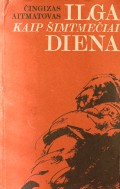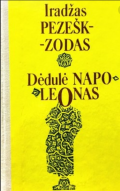 Authors:
Authors:
Aitmatov, Chinghiz
Translated by:
Vaitkus, Juozas
Translated from:
Russian
Published on:
1987
The plot of the novel takes place in Central Asia Sary Ozek steppe, during the Cold War. The pivotal objects and livelihood of the locals: Buranly-Buran train station and the constantly rattling trains, which \”go from east to west and from west to east…” Everything was measured in this unrelenting and void steppe from the train rails, like from the Greenwich meridian. More
 Authors:
Authors:
Pezeshkzad, Iraj
Translated by:
Ferensienė, Goda
Translated from:
Russian
Published on:
1987
Iraj Pezeshkzad tells a story about a life of a non-traditional family during the World War II in Teheran in a book called “My uncle Napoleon”. This comical novel is very charming and full of funny dialogs as well as interesting stories. This book also views the Muslim culture and daily life in a non-traditional way.
The book tells a story about a life of one wealthy Iranian family. The main storyteller is a teenage boy, who has fallen deeply in love with his neighbour and a family member Leila. A young man tells various stories about his family‘s daily life. The main character of his stories become his uncle Uncle Napoleon. Uncle Napoleon is indeed an extraordinary More
 Authors:
Authors:
Abe, Kōbō
Translated by:
Lenkauskienė, Dalia
One of the premier Japanese novels of the twentieth century, “The Women in the Dunes” combines the essence of myth, suspense, and the existential novel. In a remote seaside village, Niki Jumpei, a teacher and amateur entomologist, is held captive with a young woman at the bottom of a vast sand pit where, Sisyphus-like, they are pressed into shoveling off the ever-advancing sand dunes that threaten the village.
 Authors:
Authors:
Morimura, Seiichi
Translated by:
Nekrašius, Stanislovas
Translated from:
Russian
Published on:
1986
This novel is about Japanese journalist named Hiran. Hiran worked in nothing special Japanese newspaper „Sagami Shimpo“. Containers of Death and Hiran story began very early in the book, (at his childhood) and ended in the end of the book. In the beginning there are three, the most important things: Hiran and girl named Mari first meeting, the „accident“ and meeting with the same girl after 20 years. These three events were the most important thing in this whole story, because they were in charge of beginning and continuation. Author knew exactly what he wanted from this book, so he decided to lead Hiran through the whole story to Mari without his own knowledge. More
 Authors:
Authors:
Rakesh, Mohan
Translated by:
Urbanavičiūtė-Markevičienė, Ona Žaneta
Translated from:
Hindi.
Published on:
1986
“Closed dark rooms” is a novel written by a famous Indian writer Mohan Rakesh. The story is full of family drama as well as problems of the daily life.
The action of the novel takes place in Deli – the capital of India. One day the main character Madhusudan runs into his old friend Harbans who he hasn‘t seen in over a decade. Madhusudan is a redactor of one well-known local newspaper. He recently moved to Deli from Lakhnau, where he was living, due to work. The life of Mudhusudan is monotonous, uncomplicated and filled with loneliness. He lives in a small rented apartment with his friend and More
 Authors:
Authors:
Nizami Ganjavi
Translated from:
Russian
Published on:
1985
Layla and Majnun is one of the most popular story in the Islamic world, enduring in legends, tales, poems, songs, and epics from the Caucasus to Africa and from the Atlantic to the Indian Ocean. Because of the tragic destiny of two young lovers told in this poem, it is frequently called the „Romeo and Juliet“ of the East. One main difference between Nizami‘s and Shakespeare‘s poems is that two lovers are separated because of war between two families in Romeo and Juliet, and in Layla and Majnun, written 400 years before Romeo and Juliet, the couple can‘t be together because of strict customs and religion that affected other people opinions and also Layla‘s family resistance against their love. More
 Authors:
Authors:
Kobayashi, Kyuzo
Translated by:
Skuodžiūnienė, Danutė
Translated from:
Russian
Published on:
1984
In “The August without Emperor” is a political detective story, the author is using facts from 1961 “self-defense forces” attempt to overthrow the Japanese government. He’s writing very cleverly about the main mechanics of this rebellion. The book talks about Japanese militarism concept, the corruption of politics, secret contacts with big company monopolies and fascist organizations. Also, the author is trying to show us the unofficial censorship of the press and governments trials to … More
 Authors:
Authors:
Joshi, Ilachandr
Translated by:
Urbanavičiūtė-Markevičienė, Ona Žaneta
Translated from:
Hindi
Published on:
1984
Ilachandra Joshi in his novel \’Wanderer\’ reveals India\’s painful social problems in the second half of the 20th century. The novel depicts a capitalist city, where human life is no longer valued. A person is not evaluated by personal qualities or education but instead by how much profit can he make to the government that has been corrupted by greed.
More
 Authors:
Authors:
Kawabata, Yasunari
Translated by:
Mickienė, Aldona
Translated from:
Russian
Published on:
1983
The beginning of the story takes us to the 62nd summer of Shingo Ogata. The main character Shingo Ogata with his family (wife Yasuka, son Shuichi, daughter in law Kikuka) lives in the city of Kamakura. And even though this family seems happy it is only a temporary illusion. Soon we find out that Shuichi is cheating on his wife Kikuka and Shingo has already begun to experience temporary lapses of memory. The depressing memories and disturbing dreams can‘t seem to leave the aging hero alone. And when Shingo finally starts to get used to his vivid dreams one night he is woken up and hears the sound of the mountain. Which he later on takes as an omen of his impending death. Not long after the incident, Shingo’s married daughter Fusaka comes back barging in into his life. By only carrying and old Furoshike and her daughters she is here to stay. Shingo realizes that his past actions are to be blamed, and perceives the difficulties of his adult children to be the fruit of his poor parenting. And even though he‘s struggling to bring happiness to his family, he can never forget the face of Yasuka’s dead sister whom he still loves truly. More
 Authors:
Authors:
Ihara Saikaku
Translated by:
Ferensienė, Goda
Translated from:
Russian
Published on:
1983
This book is composed of four sets of short stories. They depict Edo period in Japan and its residents of different castes and professions. These are real stories of the seventeenth century Japanese daily life, about the pleasures of love, life’s comicality and dangers of passion, Japanese traditions, castes’ and genders’ relations. The characters of Saikaku’s works transcend the laws of society and religion, and for that are punished or killed. Author\’s ideal – a frugal, prudent trader, an industrious craftsman, a good father and son, a faithful wife and a dedicated daughter. However, he sympathizes with those whose deeds and feelings do not meet the rules of life, shows the tragedy of their lives. More
 Authors:
Aitmatov, Chinghiz
Authors:
Aitmatov, Chinghiz 
 Authors:
Pezeshkzad, Iraj
Authors:
Pezeshkzad, Iraj  Authors:
Abe, Kōbō
Authors:
Abe, Kōbō  Authors:
Morimura, Seiichi
Authors:
Morimura, Seiichi  Authors:
Rakesh, Mohan
Authors:
Rakesh, Mohan  Authors:
Nizami Ganjavi
Authors:
Nizami Ganjavi  Authors:
Kobayashi, Kyuzo
Authors:
Kobayashi, Kyuzo  Authors:
Joshi, Ilachandr
Authors:
Joshi, Ilachandr  Authors:
Kawabata, Yasunari
Authors:
Kawabata, Yasunari  Authors:
Ihara Saikaku
Authors:
Ihara Saikaku